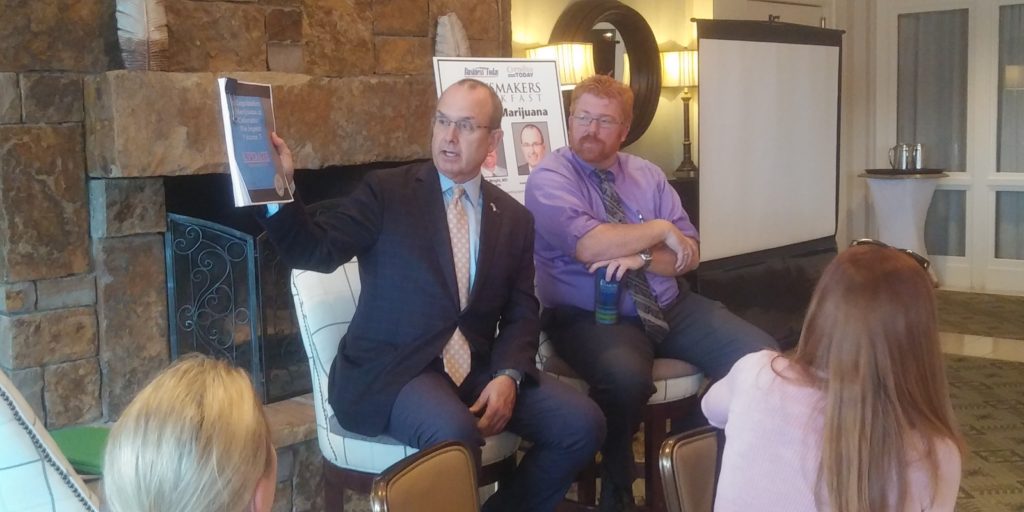
Former NC Sen. Jeff Tarte and William Wright, MD, an addiction specialist at Atrium
By Erica Batten. The question of whether to legalize the medical use of marijuana is about more than just the health effects, but the potential for cannabis products to treat chronic pain, anxiety, insomnia and inflammation, among other potential medicinal benefits, is what typically starts the conversation.
Medical marijuana is already legal in 15 states, and pending in 14 more. California is currently considering legalizing marijuana for recreational purposes, not just medical.
NC House Bill 401 would create the Medical Cannabis Act, which would protect patients with a registry identification card with debilitating medical conditions and their physicians and caregivers, from arrest and prosecution.
At a Newsmakers Breakfast hosted by Business Today in June, Dr. William Wright, an addiction psychiatrist with Atrium Health, and Jeff Tarte, a former NC District 41 senator who served on the Senate Health Care Committee for six years, hashed out the pros and cons.
“The vast majority of the [North Carolina] population wants it legalized,” said Tarte. But legalization has “social impact issues,” including potential increased hospitalization and traffic fatality rates—and the potential for legalization to actually drive the black market.
That’s what has happened in Colorado, Tarte said, where out-of-state sellers use the state’s system of legal dispensaries to locate customers. Tarte said he has been in frequent contact with legislators from that state, where medicinal marijuana use was legalized in 2000.
Cannabis is the umbrella term for a family of plants that include both the marijuana plant and the hemp plant. Marijuana plants and their derivatives contain high levels of tetrahydrocannabinol or THC, the psychoactive ingredient that produces a “high.” While hemp products also contain low levels of THC, they contain high levels of cannabidiol, or CBD, and are typically used to produce CBD oils for therapeutic use. CBD products are legal in North Carolina as long as the THC levels do not exceed 0.3 percent.
According to the World Health Organization, CBD can potentially treat several major diseases, such as Alzheimer’s disease, Crohn’s disease and multiple sclerosis. CBD’s potential for disease treatment extends to other drug addiction, including addiction to opioids, cocaine and psychostimulants.
For most disease treatment, the research is limited. However, the WHO reports that clinical trials have proven the effectiveness of CBD in treating some forms of epilepsy.
“There’s not the greatest evidence for its use as what [proponents of legalization] tout it for,” said Wright, who pointed to grim statistics about teen marijuana use in states where it had been legalized.
“What we know is that cannabis interferes with brain development,” he said. Like Tarte, Wright is concerned about the effects of marijuana use on the population at large, particularly when it comes to highway safety.
“Your reflexes are still impaired,” Wright said. “Your reaction time is still impaired.”
He also questioned the medical benefits of cannabis.
A recent article in The Atlantic magazine highlighted findings from the Proceedings of the National Academy of Sciences suggesting an increase in opioid overdose deaths in states where medical marijuana has been legalized—not the expected decrease that had accompanied what was to be an alternative to opioid-based pain management.
There seems to be a new Gold Rush under way, with shops popping up in retail locations almost everywhere.
“We don’t have enough data,” Wright said about the purported benefits of medical marijuana use. He added that physicians are wary of giving the green-light to a drug that hasn’t been well studied, particularly in light of the medical profession’s role in advancing opioid use and the ensuing abuse epidemic.
“I’m afraid we’re getting into the same kind of thing,” Wright said. “There has to be more research.”
Medicinal uses for marijuana have not been thoroughly studied—and won’t be—as long as the drug remains a Schedule I controlled substance under federal law.
What research has been done involves the increasing potency of marijuana, Wright said. Through bioengineering, the levels of THC in these plants have increased exponentially in the last 25 years. Whereas the typical level of THC in marijuana in 1995 was 4%, today it’s about 12%, with several varieties greatly exceeding that level. One, dubbed “Girl Scout Cookies,” has a THC level of almost 22%. For derivatives like oils, waxes and a glassy concentrate called shatter, THC levels can reach 97%.

Michael Sims, owner Charlotte CBD
“I’ve seen products with 100%,” said Michael Sims, owner of Charlotte CBD, which opened in October. He, along with Lee VanTine, used the panel discussion’s question-and-answer format to express dissenting views on the legalization of marijuana. VanTine is the proprietor of Apotheca CBD stores in Greensboro and Asheville, with a store opening soon in Cornelius.
“We’re being fed misinformation,” said Sims. “I have patients coming in every day in tears, saying that they’ve been on 12, 13 medications, and now they’re on nothing.”
VanTine agreed. “There’s a lot of one-sidedness going on,” he said. “We have anecdotal evidence. All. Day. Long.”
Whether the science will ultimately support medicinal use of cannabis products or not, Sims is poised to take advantage of its potential legalization in what has traditionally been a tobacco-producing state. He said his store is set up like a dispensary, where clients are advised of the possible effects of cannabis therapeutics and are required to present proof of age.
“We market very clearly,” Sims said. “We take it very seriously.”
The Newsmakers Breakfast presenting sponsor was Ckezepis Law. The Breakfast sponsors were Jack’s Corner Tap and KS Audio Video. The Coffee sponsors were James Funeral Home, Aquesta Bank, and Allen Tate realtors Dixie Dean and Christina Stone.

Discussion
No comments yet.